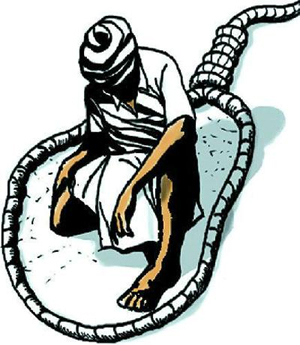Mumbai, Feb 19: In controversial remarks, BJP MP Gopal Shetty has attributed farmers' suicides to a "fashion" and "trend" to end lives.

"Not all farmers' suicides happen due to unemployment and starvation. A fashion is going on. A trend is on," Shetty, who represents north Mumbai, said after an event held in Borivili here yesterday.
"If Maharashtra government is giving five lakh rupees as compensation, then some other government in neighbouring state is giving seven lakh," he said."There's a competition in these people in giving money (compensation) to farmers," the first time MP said.
Condemning the comments, Congress said the "insensitive" remarks by Shetty show BJP's "insensitivity" towards farmers.
"At a time when Maharashtra is undergoing its worst-ever agrarian crisis, Shetty's remarks show how insensitive he and his party are towards thousands of farmers who have committed suicide due to debt and crop failure," MRCC president Sanjay Nirupam said.
Notably, the state government had two days back informed the Bombay High Court that 124 farmers have committed suicide in the state since January this year.The HC had asked the Centre what kind of assistance it provides to the state to deal with the grim agrarian crisis.
Observing that this was a serious issue, a bench headed by Justice Naresh Patil had asked the Additional Solicitor General to inform the High Court whether the Centre can chip in to provide schemes and financial help to the state to tide over the crisis.
Advocate General Srihari Aney had informed the bench that 124 farmers have taken their lives in the past one-and-half month, of whom 20 cases were reported from Osmanabad alone. The AG said factors such as crop failure due to scanty rainfall, meagre water supply for drinking and growing crops, insufficient capacity to repay loans and pressure from banks and money lenders were the causes that drove the farmers to commit suicide.





Comments
Cheddis are the real terrorist of INDIA
All these years they played with the minds of people cos people just digest what is said in the media which is controlled by them.
Now people started to investigate & find out the reality of all those deception & day by day we are finding more and more evidence involved by these goondas to keep fearing the society in different evil ways... Cheddis are the real culprits who bow down to evil masters... who like to suck the blood of innocents.. They are the enemies of INDIA not just muslims.
We can over power these EVILS -- We need to UNITE to keep this menace out of our society.
RSS has a history of assaulting people in a different garb. They wear police uniforms attacked Muslim homes. They pretend like Mulsims and dressed and created hindu muslim riots in Western UP. This was repeated in Gujarat 2002 riots.
These lawless lawyers no other than RSS cadets with lawyers suit boot and followers of Narendra Modi a Neo Serb. Unfortunately, Delhi Police commissioner also speaks in RSS way to curb the freedom of expression and curb the press. This is unacceptable to Indian people have to hate this communal fringe elements and deplore their actions.
BLACK COURTS ARE REAL GOONDAS.///
Add new comment